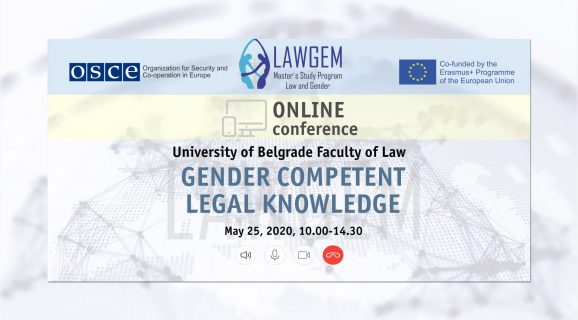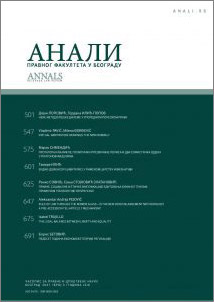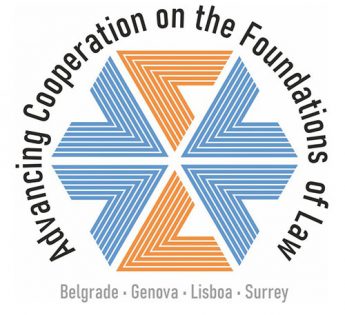
LAWGEM online conference
The Faculty of Law University of Belgrade has been coordinating the prestigious European project `New Quality in Education for Gender Equality – Strategic Partnership for the Development of Master`s Study Program LAW AND GENDER` /LAWGEM/, together with consortium partners from Cadiz University Spain, Lumsa University Italy, Orebro University Sweden, and Saarland University/Europa Institut Germany.
The most important intellectual output planned to be created in the frame of the LAWGEM project is Curriculum with 17 syllabi, for purposes of establishing/accrediting and implementing in the near future the master`s study program LAW AND GENDER. Courses proposed to be included are: Civil Law and Gender Equality, Private International Law and Gender Equality, Gender Sensitive Family Law, Gender Equality and Business Law, Gender Perspective of Labor and Social Security Law, Public Law and Gender Equality, Gender Equitable Taxation, Gender Sensitive Criminal Law, Public Policies on Gender Equality, Human Rights Law – Gender Perspective, International and EU Law and Gender Equality, Feminist Judgments, Gender Issues in Comparative Legal History, Feminist Legal and Political Theories, Sociology of Law and Gender Equality, Gender Sensitive Criminology, Feminist Economics/Gender Economics.
Learning, Teaching, Training workshop (LTT) was planned to be held from 11 to 15 of May, 2020, in order to help the research groups from 5 consortium universities to create as better as possible syllabi and Curriculum for master`s study program Law and Gender.
According to the circumstances of the pandemic, the LTT Workshop is postponed for November 16-20, 2020. The ONLINE conference will be organized instead, with the prestigious key-note speakers. This ONLINE workshop will fulfill the task of helping the research teams` participants to comprehend more deeply the gender sensitive discourse and approach in legal education.
The presentations shall start from 2 methodological principles – firstly, to give the contribution regarding gender sensitive reconsideration of particular legal fields (some of the legal fields listed above), and, secondly, to give the contribution to conceptual clarifications regarding meaning of gender identity, equality, privacy, power relations, violence, self-determination, contract, etc.
Event address for attendees: https://ppma.webex.com/ppma/onstage/g.php?MTID=ed6686d02ba25b4287e06804f27ab6090
AGENDA |
|
| 10.00 – 10.10 | Introductory words Prof. Dr. Dragica Vujadinović, University of Belgrade Faculty of Law |
| I CONCEPTUAL ISSUES | |
| 10.10 – 10.40 | Gender and Law: Concepts – Controversies – Changes Prof. Dr. Susanne Baer, LL.M.. Humboldt University Faculty of Law & Center for Gender Studies, Justice of the German Federal Constitutional Court“Gender” is a rather demanding concept, dedicated to capture the – changing, and controversial – nature of social structure, cultural and political practice, as well as intimate relationships and personal identity, as it is marked by our understandings of sex and sexuality, specifically regarding men/ masculinity and women/ femininity. Since it is powerful in life, it must be powerful in law as well.
Certainly, varying contexts do make a difference, in that questions of gender may seem more or less relevant to people in different situations of life (compare a single mother to an affluent businessman) and in different economic and political contexts (compare a country in transition from authoritarian to democratic rule, or backwards, to an “old” democracy, or an autocratic state, and compare the gender regimes in varieties of capitalism). But feminist and gender studies of law have exposed some features that inform a gender competent analysis, to ask the right question that then results in nuanced answers. Against this background, the session presents basic elements of a gender competent understanding of law. One such element is the development from notions of “the” woman, to a recognition of women, to gender, from hegemonic to more differentiated and even fluid notions of sex. Another element is the law´s problematic distinction between public and private, which informs understandings of politics (and the rules that govern democracy), categorical distinctions between civil and public law, and many notions in law from liberty to family, from self-determination and contracts, etc, Also, a gender competent analysis of law is based on a thorough understanding of (controversial) notions of equality and discrimination, informed by an understanding of inequality as hierarchy, dominance, exclusion or harm. In addition, a focus on gender means, today, to also always confront the challenge of understanding equality as multidimensional (or “intersectional”), thus take “sex +” into account. |
| 10.40 – 11.10 | Gender and Crime: Women and Responsibility Prof. Dr Nicola Lacey, London School of Economics and Political ScienceWhen you think of famous crimes, who committed them? And when you think of someone murdered, who exactly comes to mind? Today, the paradigmatic criminal is male, while the stereotypical victim is female, as well as young, which may signal innocence, while a perpetrator is considered guilty, personally responsible for a crime. These are images that have come a long way, painted in literature and theatre plays and movies, constantly perpetuated in crime series on TV and the internet, present in the world of games. On the one hand, this history has often discounted women’s agency and minimised the terrain over which it may be exercised, as well as distorting our view of how, when and why women broke the law. On the other hand, the heavily gendered notion of crime informs a world of criminal law and punishment, up to the organization of prisons, that deserves a gender competent analysis, and critique to inspire reform. However, gendered notions of the criminal subject do dominate. They are retold in case reports by the media, and, last but not least, such gendered notions of crime inform criminal law case examples, textbooks and exams.
The presentation will address the gendered notions in criminal law, over the course of modern legal history up to the present day. How have cultural representations of women as offenders and victims changed over time, and what does this tell us about criminal law as a form of state power? Are guilt and responsibility neutral concepts? Or is the subject of criminal law gendered? Why and where is gender relevant in our understandings of criminal law? |
| 11.10 – 11.40 | Family Law and Gender Equality Prof. Dr. Rosemary Hunter, University of Kent Law SchoolIt is impossible to think about family law without thinking about gender. Family law is populated by gendered characters – wives and husbands, mothers and fathers, same-sex couples and trans people. Consequently it is heavily involved in the construction of gendered subjects. Furthermore, the social context in which family law operates is thoroughly gendered, meaning that even when the law is expressed in gender neutral terms (‘spouses’, ‘partners’, ‘parents’) it has gendered effects. It follows that family law is a key site where gender equality might be promoted or, conversely, where gendered inequalities might be reproduced.
In this presentation I will focus on four areas of family law that have implications for gender equality or inequality: division of marital property on divorce, post-separation parenting arrangements, surrogacy, and family dispute resolution. The particular legal rules relating to each of these areas vary between jurisdictions. But whatever the rules may be, similar questions arise. How do the legal rules interact with the gender division of labour within families and gendered social structures? Does the law produce different material effects for women and men? What gendered subjects does the law construct and what value does it attach to them? Common themes also appear across these four areas. One of those themes is the public-private divide. This is a pervasive issue for family law. To what extent are events occurring and arrangements made within the ‘private’ sphere of the family seen as matters that are not the concern of the state? To what extent does family law rely on, encourage or fail to question ‘private’ arrangements? What are the gendered effects of the promotion and protection of privacy? Secondly, there are questions about the nature of gender equality itself. Legal rules often provide for formal equality, treating husbands and wives, mothers and fathers as if they were exactly the same. But this can fail to reflect gender differences and end up producing gendered disadvantage. In order to avoid systematic disadvantages, a more substantive approach to equality is needed. What, then, are the requirements for substantive equality in family law? |
| 11.40 – 12.30 | Q & A moderated by Prof. Dr. Dragica Vujadinović, University of Belgrade Faculty of Law |
| II FEMINIST JUDGEMENTS | |
| 12.30 – 13.00 | Feminist Judging, Prof. Dr. Silvia Suteu, UCL Laws Bentham HouseMuch teaching of law is focused around legal judgments. Whether relied on as the source of legal principles or else to illustrate the application of legal norms, judgments are central to legal education. Yet often, the gendered nature of judging remains cloaked and the law student blind to the systemic gender biases permeating this received wisdom.
Feminist Judgments projects have aimed to correct this by creatively and critically rewriting judgments from a feminist perspective. They have highlighted the shortcomings of much of judging as we know it, and have provided a model for more gender-sensitive judging. The first iteration tackled English judgments, with subsequent feminist judgments projects in the area of Australian law, Northern/Irish law, US tax law, international law, and Scots law. These projects have revealed the need to incorporate women’s experience into decision-making and the formulation of legal rules, as well as to rethink more broadly what gender justice demands. While academic exercises, such projects nevertheless strive to be realistic and have exposed that judicial outcomes are not inevitable. They have also moved the debate from focusing solely on judicial diversity to investigating the substantive difference that a feminist approach to judging might make in real cases. However, these examples have so far been limited to Western legal systems and also mostly to those in the common law world. As part of a new research project, I am interested in exploring the question of what feminist judging might look like beyond these contexts. My focus is on Central and Eastern European countries and the specific challenges and opportunities for feminist judging in the region. Not only are these countries part of the civil law tradition, and thereby their courts less likely to issue the type of discursive judgments familiar to the common lawyer, but they also operate under different constraints, including a propensity for formalism inherited from the communist legal method. The role of the judge in the legal process is different, as are the traditions, legacies, and unspoken norms. Legal education and the overall legal culture in these countries will present obstacles and openings unlike those of their common law counterparts. Last but not least, there has been strong backlash against gender equality in the region, as exemplified by the Bulgarian Constitutional Court’s 2018 ruling that the Istanbul Convention on violence against women contravenes the country’s constitution. The current climate therefore makes it that much more important to study, model, and push for feminist judging. This contribution will present the key contours of this research project and highlight the relevance of a Feminist Judgments project for Central and Eastern Europe. It will also explain the link between such a project and gender-sensitive legal education, with potential applications in a variety of taught legal subjects. |
| 13.00 – 13.30 | ECHR – Case Law Relevant for Feminist Justice, Prof. Dr. Ivana Jelic, University of Montenegro Faculty of Law, Justice of the European Court of Human Rights
Gender equality is clearly one of the pillar principles of the European Convention on Human Rights. Protection of women’s rights can be treated through an individual right, dealing with its substantial and procedural limb (ex. sex discrimination cases), or as an (aggravated) aspect or an attribute of a violation of a right enshrined by the Convention (ex. gender equality in connection with rights to freedom of expression or religion). Despite its principled position, and having in mind the present state of jurisprudence of the Strasbourg Court, it could be concluded that feminist justice is still underdeveloped in comparison with the growing need for the protection of women’s rights, insisting on personal integrity. Observing from a broader perspective, the ECtHR’s case law regarding feminist justice can be categorized into three clusters: (1) cases relating to achieving formal equality between men and women and prohibiting direct gender discrimination, focusing on the idea of achieving “sameness with men” (jurisprudence under article 14); (2) cases relating to issues that may, in theory, affect both men and women, but in reality, disproportionately affect women and require special (additional) protection, such as domestic violence and trafficking; and (3) cases relating to issues that are specific to women’s rights, such as violence against women, reproductive rights and motherhood/maternity. The Court has gradually widened its approach concerning the protection of women’s rights, giving rise to a ‘living instrument doctrine’ by interpreting the Convention “in the light of present day conditions”. This approach of evaluative interpretation of the Convention is necessary in order to address actual challenges of violation of human rights of women and girls, which were not envisaged in the text of the Convention 70 years ago. For the purposes of the conference, the speaker will make a short introduction of how contemporary international law deals with feminist justice, with an emphasis on the list of important ECtHR cases. Then, the cases would be analyzed under each of the mentioned three categories, with an emphasis on the recent case-law. Conclusion will encompass speaker’s observations about the ECtHR’s jurisprudence and comparison with certain case-law of the UN treaty bodies or other international courts. |
| 13.30 – 14.30 | Q & A, moderated by Prof. Dr. Dragica Vujadinović, University of Belgrade Faculty of Law |




